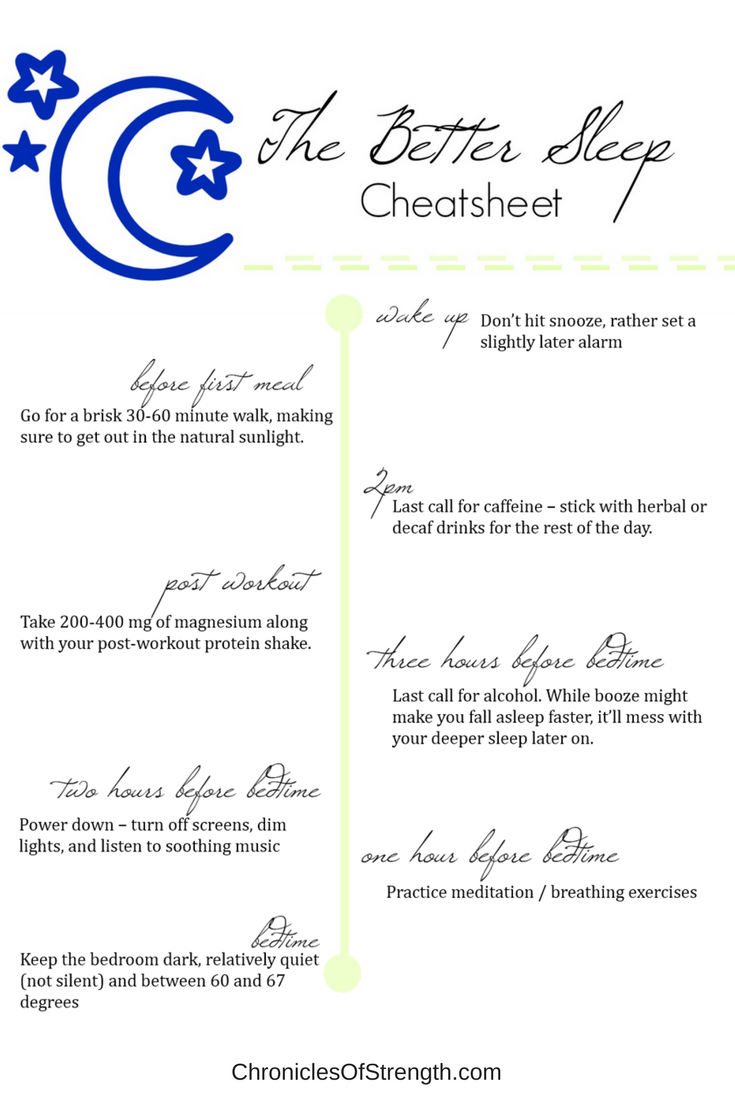How to Get to Sleep Faster, Stay Asleep, and Sleep Better
For as important as sleep is (you will literally go insane without it), it’s not something that comes easily for a lot of people, like, more than 60 million people in the U.S. alone need to improve their sleep quality.
Run-of-the-mill sleep issues typically fall into three buckets:
- difficulty falling asleep
- difficulty staying asleep
- difficulty falling and staying asleep
I have three kids under the age of 4 so currently I’ve been forced into that second bucket, but after struggling with my sleep in my younger years, I broke free of sleep issues and historically have been able to get to sleep quickly and stay asleep. It’s my superpower. But it’s not from pure luck. I’ve practiced making my sleep better, hardwiring my body and mind to sleep well. The science behind my methods will back me up.
But before we look into the practical application of sleep-inducing methods…
Here are some important sleep truths:
- Sleep debt, or not consistently sleeping the recommended 7-9 hours a night, does accumulate, making it harder to focus, remember things, and be physically coordinated.
- If you can’t get the recommended 7-9 hours each night and have accumulated a sleep debt, you can erase some of the deleterious effects of poor sleep by catching up, say, on the weekends…
- …But doing so won’t bring you back to peak mental performance or fully lower cortisol levels (cortisol is a stress hormone that helps keep fat, particularly belly fat, on your body)
- To keep in peak physical and mental shape, you need to consistently get 7-9 hours. Easy said than done, right?
So if consistently sleeping 7-9 hours is so crucial, but it’s difficult for you to get and/or fall asleep, what can you do? Quite a few things actually.
Here are four scientifically proven ways to get better sleep, starting tonight.
- Create a nighttime power down ritual. This can take some time to figure out what works best for you. But to start, decide what time you’d like to be in bed by. Make sure it’s a time you can consistently stick to. For me, 10:30pm is the most doable. That gives me time after my kids are in bed to finish up light household chores early enough that I can spend a couple hours relaxing. An hour to two before bed, turn off all screens – phone, tablet, TV – and start to turn the lights down, put on some candles, and do something relaxing – meditate, read a light book, listen to music, drink some sleepytime tea, talk quietly with your spouse, have sex, etc.
- Use your bedroom for sleep and sex only. Using it for just these purposes trains your brain into viewing the bedroom as a place for relaxation, not work or stress. Note: If you can’t fall asleep within 20 minutes of getting into bed, leave the bedroom and go into another room that you can reset, doing something relaxing.
- Exercise. But not right before bed. Scheduling workouts can be difficult, but if you find yourself working out within two hours of your desired bedtime, something needs to switch. Instead, do your moderate or intense exercise earlier in the day. Gentle yoga or a light walk can be used as part of your nighttime relaxation routine.
- Go for a walk outside. Sunlight! Walking! Two things that help promote relaxation and sleep. 30-60 minutes most, if not all, days will dramatically improve your sleep quality.
Other things to consider:
- Taking a calcium/magnesium supplement (I like this one)
- Don’t drink any alcohol three hours before going to bed. While drinking may help you fall asleep, you will have a much harder time staying asleep.
- To minimize overnight bathroom trips, don’t drink anything an hour before bed.
- Make sure you’re getting enough to eat in the evening hours. If you’re an intermittent fasting follower, you should be consuming the bulk of your calories in the evenings (nights are referred to as “feed and breed” times for a reason)
- Nix caffeine before 3pm. If you’re sensitive to caffeine, you may need to cut off caffeine by noon.
Taking all these things into consideration, a sample daily Better Sleep routine may look something like this:

Finally, if you’re having trouble sleeping or would simply like to improve the quality of your sleep, I do suggest trying to give your feet a quick bath right before bed. Even using a washcloth with warm water, give your feet a quick scrub and then hop into bed. While I can’t find any scientific evidence to bolster my claim, this is one thing I do that gets me to sleep quickly (that and, if I’m having a difficult time falling asleep, I get out of bed, remake the sheets, and then get back in – it works like a restart to the very tail-end of my nighttime routine).
What are your tricks and tips for getting high quality ZZZs? Comment below!
Christine Mooney is a writer, mom, manager of the Mooney-Flynn household, and trained kettlebell instructor. No matter how the day goes, everyone is fed, clothed, and clean so she’ll count that as a win. Got COS related questions? You can reach her at ChristineMooney(at)ChroniclesOfStrength(dot)com